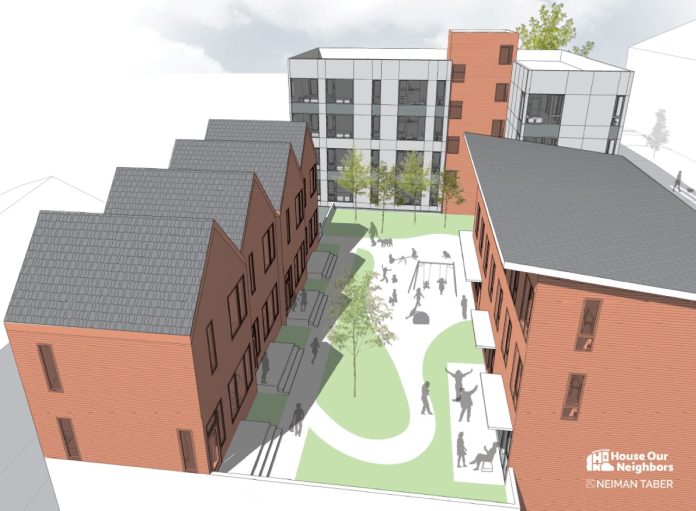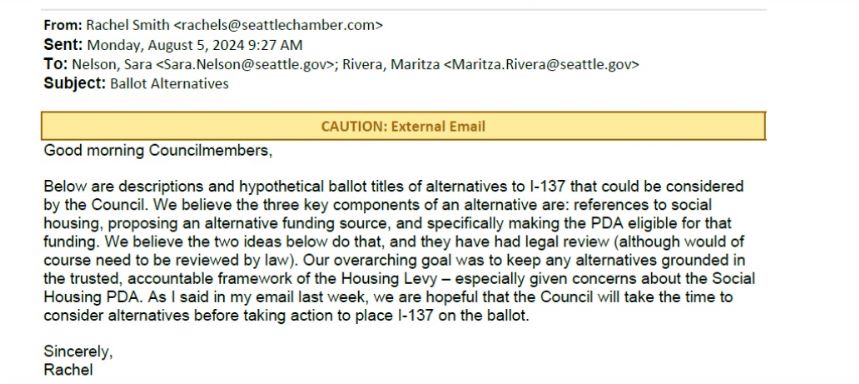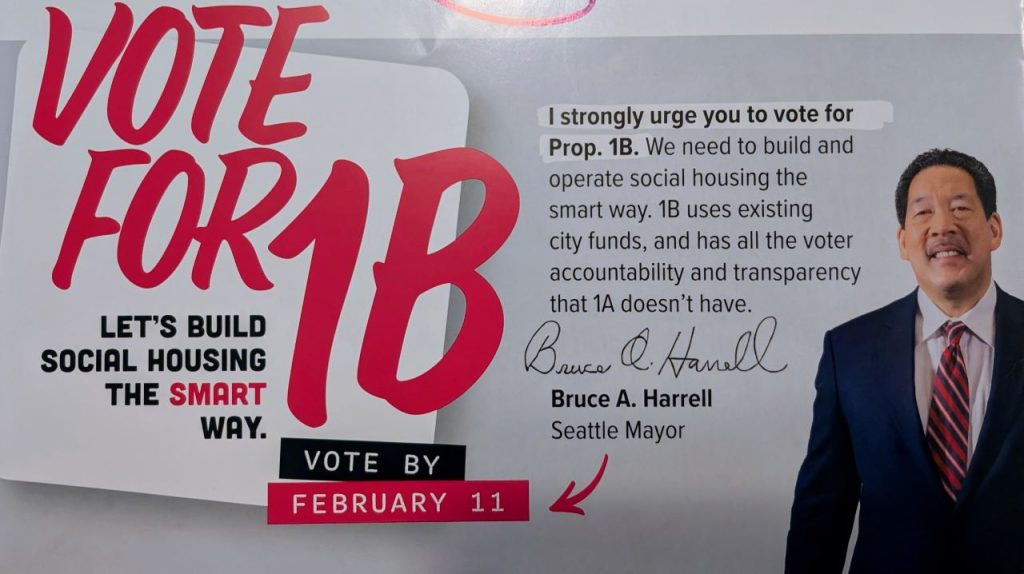
Today is the last day to vote in the special election deciding the fate of the Seattle Social Housing Developer, and House Our Neighbors, the grassroots group behind the social housing effort, just revealed a bombshell. According to a public records request that the group shared Monday, the Seattle Metropolitan Chamber of Commerce orchestrated the plan to force the social housing funding measure off the high-turnout November presidential election and onto a low-turnout February election facing a competing measure.
In fact, the email sent August 5 suggests that the chamber even crafted the ballot language for Proposition 1B and conducted legal review to ensure it would pass muster. In the email, Chamber President and CEO Rachel Smith pressured Council President Sara Nelson and Councilmember Maritza Rivera (District 4) to delay House Our Neighbor’s Initiative 137 (which became Proposition 1A) and add competing Proposition 1B. Furthermore, she specifically advocated for inclusion of misleading language suggesting both initiatives would fund the same type of social housing.

In reality, House Our Neighbors proposed a mixed-income cross-subsidy model that has not been attempted in Seattle, whereas the Chamber’s proposal would keep funding same type of nonprofit housing that Seattle already produces. This difference — and the opportunity to innovate and try a new model of creating housing successful in other parts of the world — is a big reason why The Urbanist Elections Committee (of which I am a member) endorsed Proposition 1A and urged Seattleites to vote to back it in the special election.
Similarly, the respective funding sources are quite different.
Proposition 1A would levy an excess compensation payroll tax on some of the biggest and most profitable companies in the city, raising approximately $53 million annually via a 5% tax on individual compensation exceeding $1 million annually. Companies who do not compensate individual employees more than $1 million annually would be exempt from the tax.
Meanwhile, Proposition 1B simply skims $10 million per year from the existing JumpStart payroll expense tax fund, which Seattle City Council has already depleted significantly by diverting revenue away from affordable housing and to their preferred spending priorities. Furthermore, Prop 1B sunsets after five years so it will only raise $50 million in total, whereas Prop 1A would raise more than annually and not shift resources away from nonprofit homebuilders.
House Our Neighbors submitted their qualifying signatures to King County Elections in July, but the timing was such that Seattle City Council technically was within its rights to delay and force the measure to miss the deadline to be on the November ballot. However, Council was facing pressure to act swiftly and ensure the initiative was on the higher turnout ballot, with then-Councilmember Tammy Morales (District 2) supporting that option. Plus, some argued purposefully delaying the measure flouted the City Charter and was illegal.
Ultimately, Smith’s arguments swayed the centrist faction on Council, forcing the delay and the addition of a competing measure. It’s not hard to see where the chamber’s motivation came from since several of their members, including Amazon and Microsoft, are top political donors on the Prop 1B campaign, with more than a half a million dollars flowing in last-minute. Amazon would certainly pay the tax given the high compensation packages common among their executives. In 2023, for example, Amazon CEO Andy Jassy reportedly pulled in more than $29 million in total compensation.
On the other hand, whether Council President Sara Nelson made the right call in siding with big business over a grassroots housing initiative will ultimately be up to voters in November when they decide on her reelection.

Seattle Mayor Bruce Harrell has made a similar calculation that chamber support is more essential than pleasing social housing advocates. Harrell endorsed Prop 1B and appeared prominently on campaign literature criticizing Prop 1A and urging support for 1B.
Recent polling from Northwest Progressive Institute and Change Research indicates that the Harrell’s approval ratings have tanked with him now 10 points underwater. The poll also found that Nelson and any other councilmember not named Alexis Mercedes Rinck is unpopular. Frustration with delay tactics and the lack of progress on housing solutions appears to be a big part of that sinking approval.
Seattle voters have until 8pm to get their ballots into a ballot box or postmarked.
Doug Trumm is publisher of The Urbanist. An Urbanist writer since 2015, he dreams of pedestrian streets, bus lanes, and a mass-timber building spree to end our housing crisis. He graduated from the Evans School of Public Policy and Governance at the University of Washington in 2019. He lives in Seattle's Fremont neighborhood and loves to explore the city by foot and by bike.

